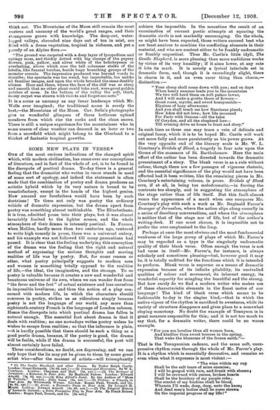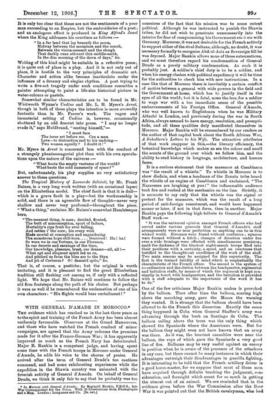SOME NEW PLAYS IN VERSE.*
ONE of the most curious indications of the changed spirit which, with modern civilisation, has come over our conceptions of literature, and in fact of the whole of art, is to be found in the disrepute of poetical drama. To-day there is a general feeling that the dramatist who writes in verse stands in need of some sort of apology, and indeed the statement is often made that the combination of poetry and drama produces an artistio hybrid which by its very nature is bound to be unsatisfactory, except in the hands of the highest genius. How amazed our forefathers would have been by such doctrines ! To them not only was poetry the ordinary vehicle of dramatic expression, but the drama apart from poetry was something almost unthinkable. The Elizabethans, it is true, admitted prose into their plays, but it was almost invariably limited to the lighter scenes, and the whole atmosphere of their drama is intensely poetical. In France, when Moliere, hardly more than two centuries ago, ventured to write high comedy in prose, there was a universal outcry, and his example was not followed till many generations had passed. It is clear that the feeling underlying this conception of the drama was the feeling that the right and natural method of expressing the serious thoughts and moving realities of life was by poetry. But, for some reason or other, what poetry principally suggests to modern men and women is something totally opposed to the realities of life,—the ideal, the imaginative, and the strange. To us poetry is valuable because it creates a new and wonderful and beauteous universe of its own, where we can wander free from "the fever and the fret" of actual existence and lose ourselves in impossible loveliness; and thus the notion of a play con- cerned with modern life, in which the characters should converse in poetry, strikes us as ridiculous simply because poetry is not the language of our world, any more than eighteenth-century French is the language of London cabmen. Hence the disrepute into which poetical drama has fallen is natural enough. The essential fact about drama is that it deals with realities; no one nowadays writes poetry unless he wishes to escape from realities; so that the inference is plain,
is hardly possible that there should be such a thing as a good poetic drama, because, if the poetry is good, the drama will be feeble, while if the drama is successful, the poet will almost certainly have failed.
These considerations, no doubt, are depressing, and we can only hope that the lie may yet be given to them by some great artist who—after the manner of artists—will triumphantly
• (1) The Gentle Shepherd, and other Poems. By Tudor Ralph Castle. London : Grant Ricbsxds. [8s. 6d. net.]—(2) Dramas and Diversions. By W. L. Courtney, London: Chapman and Hall. [5a. net.]—(3) The Dowager of Jerusalem: a Romance in Four Acts. By Reginald Ferrer. London: Edward Arnold. [3s. 6d. net.]---(4) King Alfred's Jewel. By the Author of "More it Victoria" London: John Lane. [5s. net.1—(5) Undine : a Tragedy in Your Acts, By Whitworth Wynne. London: Began Paul, Trench, and Co. [4e. 6d. net.]—(6) Arvat: a Dramatic Poem in Four Acts. By Leopold H. Myers. London: Edward Arnold. [4s. 6d. net.]—(7) The Tragical History of Leonardo Sattiati a Noble Florentine: Play in Four dots. By Frank Baines. London Began Paul, Trench, and Co. [5a net.]
achieve the impossible. In the meantime the result of an examination of current poetic attempts at squaring the dramatic circle is not markedly encouraging. On the whole, as might have been expected, those writers succeed best who are least anxious to combine the conflicting elements in their material, and who are content either to be frankly undramatic
or frankly unpoetical. Thus Mr. Castle's little idyll, The Gentle Shepherd, is more pleasing than more ambitious works by virtue of its very humility ; if it aims lower, at any rate it hits its mark. It is merely a lyrical interlude set in dramatic form, and, though it is exceedingly slight, there
is charm in it, and an even rarer thing than charm,— distinction :—
" Your sheep shall come down with you; and on days
When heavy summer leads you to the mountains We two will herd them on soft palace lawns,
And I will make a grotto there of flowers— Great roses, myrtle, and sweet honeysuckle—
Elysium of hazy afternoons.
And you shall teach me how Narcissus pined; How A don did not love ; how Ida mourned For Paris with Oenone—all the tales
Of Corydon, and all the shepherd lore—
Till evening drive us home to feast and sleep."
In such lines as these one may trace a vein of delicate and original fancy, which it is to be hoped Mr. Castle will work out more fully and more persistently as his power grows. At the very opposite end of the literary scale is Mr. W. L. Courtney's Bridals of Blood, a tragedy in four acts upon the theme of the massacre of St. Bartholomew. Here the main effort of the author has been directed towards the dramatic presentment of a story. The blank verse is as a rule without colour, though there are a few passages of vigorous rhetoric, and the essential significance of the play would not have been affected had it been written, like the remaining pieces in Mr. Courtney's entertaining volume, in prose. Bridals of Blood
errs, if at all, in being too melodramatic,—in forcing the contrasts too sharply, and in suggesting the atmosphere of
the stage rather than of life itself. But this fault almost wears the appearance of a merit when one compares Mr. Courtney's play with such a work as Mr. Reginald Farrer's Dowager of Jerusalem, where the action slips along casually in a series of desultory conversations, and where the atmosphere is neither that of the stage nor of life, but of the author's writing-desk. If one must choose, it is impossible not to prefer the over-emphasised to the limp.
Perhaps at once the most obvious and the most fundamental weakness of the large group of plays of which Mr. Farrer's may be regarded as a type is the singularly undramatic quality of their blank verse. Often enough the verse is not bad verse in itself—Mr. Farrer's, for instance, is always scholarly and sometimes pleasing—but, however good it may be, it is totally unfitted for the functions which it is intended to perform. Blank verse is supreme as a means of dramatic expression because of its infinite pliability, its unrivalled qualities of colour and movement, its inherent energy, its wonderful capacity for mingling the beautiful and the strong.
But how rarely do we find a modern writer who makes use of these characteristic elements in the finest metre of our language ! The kind of blank verse which seems to be fashionable to-day is the elegiac kind,—that in which the native vigour of the rhythm is sacrificed to sweetness, while its variety of structure disappears and gives place to a somewhat cloying monotony. No doubt the example of Tennyson is in great measure responsible for this; and it is not too much to say that, for a dramatic writer, there could be no worse example.
"For you are lovelier than all women born, And kindlier than sweet breezes in the spring,
That wake the blossoms of the frozen earth."—
That is the Tennysonian cadence, and the same soft, unex- pressive rhythm runs through the whole of Mr. Farrer's play. It is a rhythm which is essentially decorative, and remains so even when what it expresses is most violent :—
" The wine within my cup Shall be the salt tears of mine enemies ; I will be gorged with ruin, and drunk with shame; I will be crowned with curses, broken hearts Shall be the broidery of my purple robe ; The scarlet of my buskins shall be blood, Wherein I'll wade, deep, deep, unto the knee; And dead men's bodies shall be roses strewn On the imperial progress of my life 1" It is only too clear that those are not the sentiments of a poor man succeeding to an Empire, but the embroideries of a poet; and an analogous effect is produced in King Alfred's Jewel where the King addresses his courtiers as follows :— " In a far land that lay beneath the moon, Midway between the mountain and the marsh, Between the vision-summit and the slough That darkly runs athwart this middle-earth, In the dim morning of the dawn of days," &c.
Writing of this kind might be suitable in a reflective poem; it is quite out of place in a play. And it is not only out of place, it is hostile to the very principles of dramatic art.
Character and action alike become inarticulate under the influence of a dreamy and elegiac rhythm. A poet trying to write a five-act tragedy under such conditions resembles a painter attempting to paint a life-size historical picture in water-colours or pastels.
Somewhat similar characteristics are to be found in Mr. Whitworth Wynne's Elaine and Mr. L. H. Myers's Arvat, though in both of these plays the intention is more avowedly fantastic than in Mr. Farrer's work. The vague and immaterial setting of Undine is, however, occasionally shattered by an odd descent into prose. " I may no longer evade it," says Huldbrand, " seating himself,"— " I must face
The issue set before me. Can a man Love—to distraction and to his undoing— Two women equally ? I doubt it !"
Mr. Myers in Arvat is concerned less with the conduct of a strangely phantasmagorial plot than with his own specula- tions upon the nature of the universe :— "What boots the empty vastness of the world? What boots the cold immensity of space ?"
But, unfortunately, his play supplies no very satisfactory answer to these questions.
The Tragical History of Leonardo Salviati, by Mr. Frank Baines, is a very long work written (with an occasional lapse) on the Elizabethan model. The chief fault is that it is dull—
which is a grave fault in a play—but the workmanship is solid, and there is an agreeable flow of thought—never very shallow and never very profound—throughout the piece. " What a thing," exclaims Mr. Baines's somewhat Hamletesque hero, "The meanest thing, is man ; derided, flouted, The butt of misconception, sport of failure, Mortality's ripe fruit for ever falling,
And rotten r the-core; his every wish
Made mortal at conception and engendering
The monstrous hope still-born.... Deceived! Ha! ha! So were we in our fortune, in our Florence,
In our deserts and earnings of the time, Our knowledge, pleasure, trust, our dreams—all, all !- What apt and eloquent spirit led us on, And pitched us from the blue arc to the Styx And pit of Cerberus ? 0 ! damned spite," &c.
That is, of course, a pastiche; but the original is worth imitating, and it is pleasant to find the great Elizabethan tradition still flashing out among us, if only with a reflected light. We hope that Mr. Baines will continue to follow the old firm footsteps along the path of his choice. But perhaps it were as well if he remembered the exclamation of one of his own characters : " His flights would bear curtailment!"































































 Previous page
Previous page